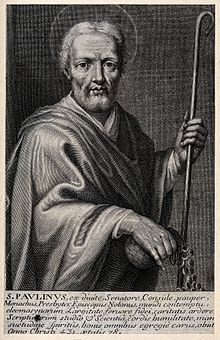BENEDICT XVI
GENERAL AUDIENCE
Paul VI Audience Hall
Wednesday, 12 December 2007
Saint Paulinus of Nola
Dear Brothers and Sisters,
The Father of the Church to whom we turn our attention today is St Paulinus of Nola. Paulinus, a contemporary of St Augustine to whom he was bound by a firm friendship, exercised his ministry at Nola in Campania, where he was a monk and later a priest and a Bishop. However, he was originally from Aquitaine in the South of France, to be precise, Bordeaux, where he was born into a high-ranking family. It was here, with the poet Ausonius as his teacher, that he received a fine literary education. He left his native region for the first time to follow his precocious political career, which was to see him rise while still young to the position of Governor of Campania. In this public office he attracted admiration for his gifts of wisdom and gentleness. It was during this period that grace caused the seed of conversion to grow in his heart. The incentive came from the simple and intense faith with which the people honoured the tomb of a saint, Felix the Martyr, at the Shrine of present-day Cimitile. As the head of public government, Paulinus took an interest in this Shrine and had a hospice for the poor built and a road to facilitate access to it for the many pilgrims.
While he was doing his best to build the city on earth, he continued discovering the way to the city in Heaven. The encounter with Christ was the destination of a laborious journey, strewn with ordeals. Difficult circumstances which resulted from his loss of favour with the political Authorities made the transience of things tangible to him. Once he had arrived at faith, he was to write: “The man without Christ is dust and shadow” (Carm. X, 289). Anxious to shed light on the meaning of life, he went to Milan to attend the school of Ambrose. He then completed his Christian formation in his native land, where he was baptized by Bishop Delphinus of Bordeaux. Marriage was also a landmark on his journey of faith. Indeed, he married Therasia, a devout noblewoman from Barcelona, with whom he had a son. He would have continued to live as a good lay Christian had not the infant’s death after only a few days intervened to rouse him, showing him that God had other plans for his life. Indeed, he felt called to consecrate himself to Christ in a rigorous ascetic life.
(To continue reading, please follow the link the to Vatican webpage here)

